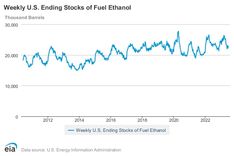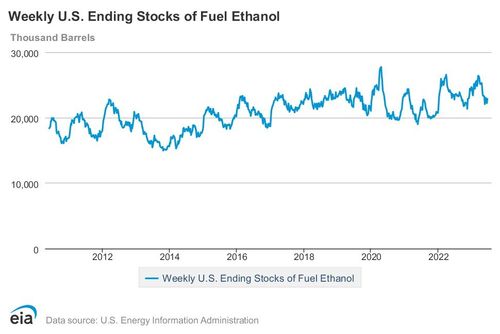EIA: Ethanol stocks up 1%, ethanol exports up 20%



SOURCE: U.S. Energy Information Administration
June 28, 2023
BY Erin Krueger
U.S. fuel ethanol production for the week ending June 23 was unchanged from the previous week, according to data released by the U.S. Energy Information Administration on June 28. Ethanol stocks were up 1 percent while exports were up nearly 20 percent.
Fuel ethanol production averaged 1.052 million barrels per day the week ending June 23, flat with the previous week. When compared to the same week of last year, ethanol production for the week ending June 23 was up 1,000 barrels per day.
Stocks of fuel ethanol expanded to 22.979 million barrels the week ending June 23, up 175,000 barrels when compared to the 22.804 million barrels of stocks reported for the previous week. When compared to the same week of last year, ethanol stock for the week ending June 23 were up 233,000 barrels.
Advertisement
Advertisement
U.S. fuel ethanol exports for the week ending June 23 reached 104,000 barrels per day, up 17,000 barrels per day when compared to the 87,000 barrels per day of exports reported for the previous week. Data on weekly ethanol exports is not available for the corresponding week of 2022 as the EIA began reporting weekly data on fuel ethanol exports earlier this month. According to EIA data, no fuel ethanol imports were reported for the week ending June 23.
Advertisement
Advertisement
Related Stories
U.S. fuel ethanol capacity fell slightly in April, while biodiesel and renewable diesel capacity held steady, according to data released by the U.S. EIA on June 30. Feedstock consumption was down when compared to the previous month.
XCF Global Inc. on July 8 provided a production update on its flagship New Rise Reno facility, underscoring that the plant has successfully produced SAF, renewable diesel, and renewable naphtha during its initial ramp-up.
The U.S. exported 31,160.5 metric tons of biodiesel and biodiesel blends of B30 and greater in May, according to data released by the USDA Foreign Agricultural Service on July 3. Biodiesel imports were 2,226.2 metric tons for the month.
CARB on June 27 announced amendments to the state’s LCFS regulations will take effect beginning on July 1. The amended regulations were approved by the agency in November 2024, but implementation was delayed due to regulatory clarity issues.
Legislation introduced in the California Senate on June 23 aims to cap the price of Low Carbon Fuel Standard credits as part of a larger effort to overhaul the state’s fuel regulations and mitigate rising gas prices.
Upcoming Events









